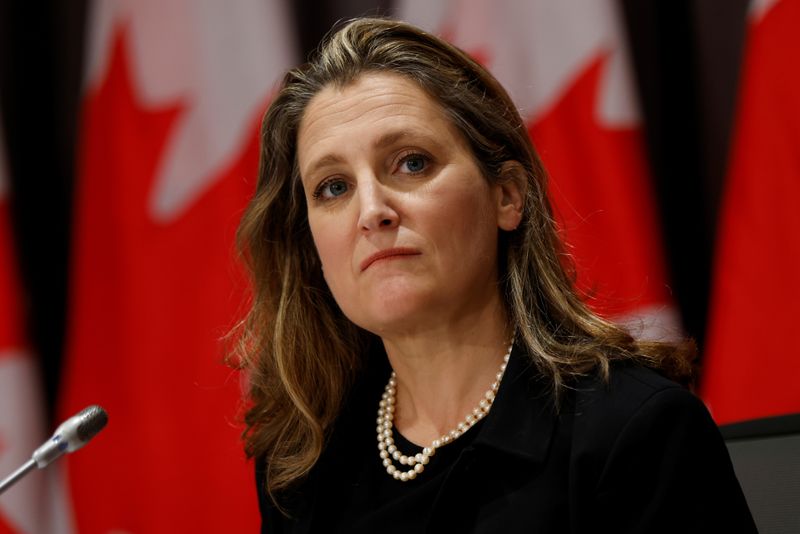By Julie Gordon and David Ljunggren
OTTAWA (Reuters) - Canada's finance minister said on Wednesday for the first time that federal pandemic aid to households and businesses had limits as the Bank of Canada chief warned of a "long slog" toward a post-coronavirus economic recovery.
In an interview with Reuters, Bank of Canada Governor Tiff Macklem noted that U.S. fourth-quarter growth could be even weaker than projected, hurting Canadian exports.
Finance Minister Chrystia Freeland, speaking at a Toronto economic forum after the central bank said it expected interest rates to stay at a record low until sometime in 2023, said that "there are no blank checks ... no free lunches."
"Our fiscally expansive approach to fighting the coronavirus cannot and will not be infinite. It is limited and temporary," she said.
But later this year, the government will deliver "targeted, carefully thought-out investment – on a meaningful scale," Freeland added after the central bank, in an update of its economic projections, said a second wave of coronavirus infections would hurt Canada's near-term growth.
New infections have surged in recent weeks, leading to targeted restrictions. The Bank of Canada held its key overnight interest rate at 0.25%, as expected.
Macklem told Reuters on Wednesday he had not yet seen Freeland's remarks, but noted that monetary policy had been complimenting fiscal policy.
"There's no question that the various emergency support, income-support measures that the government has put into place have been instrumental in putting a floor under this pandemic," Macklem said.
While the central bank now expects a smaller economic contraction in Canada in 2020 than previously forecast, it also notched down its growth outlook for 2021. It did not change its outlook for 2022, and it expects economic activity to return to pre-pandemic levels at the start of that year.
"What we're saying is, 'We're going to get through this, but it's going to be a long slog,'" Macklem said earlier on Wednesday.
The bank noted its projections assume new coronavirus outbreaks will be managed by targeted containment measures, but said the impacts could be more severe than anticipated. Deaths nationally topped 10,000 on Tuesday.
"There is a serious risk ... that broader or more intensive restrictions could be required," it said in its quarterly Monetary Policy Report.
BOND BUYING
The bank also tweaked its bond-buying program, which is designed to provide more liquidity to the economy, reducing it to C$4 billion ($3.03 billion) a week from C$5 billion, while refocusing on longer-term bonds.
The bulk of the central bank's first-ever asset purchase program has been focused on securities that mature in less than two years. Now it will be buying more assets maturing in three to 15 years, and even some 30-year bonds, Macklem said.
"I think it's quite clear that they're driving home the point that the economy will need stimulus, both fiscal and monetary, for quite some time," said Douglas Porter, chief economist at the Bank of Montreal.
Also in the interview, Macklem spoke about digital currencies, saying the bank was working with its G7 partners on its plans for a digital currency, adding that a "globally coordinated" approach was needed to prevent surprises and to keep such tools from being used by criminal elements.
The Canadian dollar CAD= was trading 1% lower at 1.3313 to the greenback, or 75.11 U.S. cents, its biggest decline since Sept. 8. It touched its weakest intraday level since Oct. 7 at 1.3333.

($1 = 1.3186 Canadian dollars)